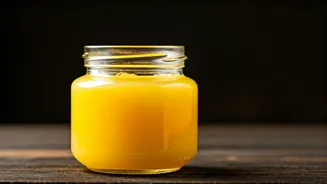Ghee: A Tradition
In Indian cuisine, ghee holds a cherished position, deeply interwoven with cultural practices and culinary traditions. It’s not just an ingredient; it embodies
a sense of heritage, passed down through generations. Across diverse Indian states, ghee signifies auspiciousness and is incorporated into various religious rituals, demonstrating its sacred significance. The use of ghee in cooking contributes to a distinct aroma and flavor, enhancing the taste of dishes, from rich curries to delicate sweets. Beyond taste, ghee is celebrated for its perceived digestive benefits and its ability to act as a carrier for fat-soluble vitamins, making it a staple food in many Indian households for its taste, and nutritional value.
Fat & Calories Matter
While ghee has cultural significance, it's crucial to acknowledge its high-fat content, influencing its caloric density. The caloric content is a central consideration when integrating ghee into your diet. This richness, while contributing to the flavor and texture of food, also affects the overall calorie intake. Monitoring ghee intake is especially important for those aiming to maintain or achieve a specific weight range. Every serving of ghee adds to the total fat consumption, influencing the balance of macronutrients in one's daily diet. It's imperative to balance ghee consumption with physical activity to ensure a healthy lifestyle. Recognizing the caloric impact of ghee allows for more mindful choices in one's dietary patterns.
Expert Insights
Consulting experts, particularly nutritionists like Dr. Siddhant Bhargava, offers essential guidance on ghee consumption. These professionals provide scientific perspectives on how much ghee one should consume based on individual health conditions and daily activities. Experts underscore the significance of mindful ghee intake as part of a holistic diet strategy. They often emphasize that overconsumption can have health consequences, suggesting that moderation is key. Nutritionists assist in navigating the complexities of ghee’s effects, providing personalized advice. Their recommendations help make well-informed decisions, balancing cultural traditions with the needs of a healthy body. This expert-driven perspective helps individuals make informed decisions about their dietary habits and overall health.
Potential Drawbacks
Excessive ghee intake can potentially lead to certain health concerns. Its high saturated fat content could possibly impact cholesterol levels and may contribute to heart-related issues, especially if the consumption is in excess. Individuals with pre-existing health conditions, like heart disease, require careful monitoring of their ghee intake, consulting with healthcare professionals for guidance. Monitoring the amount is important to prevent adverse effects like weight gain, as ghee is energy-dense. Balancing ghee consumption within an overall diet plan, paired with regular physical activity, can help minimize risks and promote better health. Being informed about these potential drawbacks allows for proactive choices, ensuring responsible ghee consumption.
Ghee’s Balancing Act
To optimize the benefits and avoid potential downsides, a balanced approach to ghee is advised. Integrating ghee in moderation helps maintain cultural appreciation while prioritizing health. Consider the frequency of ghee use and the portion sizes used in daily meals, adjusting as necessary. Coupling ghee consumption with a balanced diet inclusive of fresh vegetables, fruits, and lean proteins helps offset the high-fat content. Making an effort to stay active through exercise helps manage weight and promote cardiovascular well-being. This balanced strategy helps in enjoying ghee's flavors while adhering to healthy lifestyle habits. It promotes a sustainable approach, balancing culinary tradition with health needs and ensuring a positive relationship with ghee.














